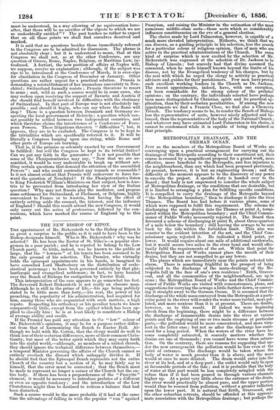THE NEW BISHOP OF RIPON.
THE appointment of Mr. Bickersteth to be the Bishop of Ripon is as great a surprise to the public as it is said to have been to the Bishop-designate himself. Who is Mr. Bickersteth ? why was he selected ? He has been the Rector of St. Giles's—a popular cler- gyman in a poor parish ; and he is reputed to belong to the Low Church party. So little, indeed, was he known to the public at large, that the " lowness " of his tenets has been assumed to be the only ground of his selection. The Premier, who virtually holds the episcopal appointments in his hands is imagined to have consulted Lord Shaftesbury on the distribution of eccle- siastical patronage ; to have been governed entirely by that phi- lanthropic and evangelical nobleman ; in fact, to have handed over the Bench of Bishops for castigation by Exeter Hall. This interpretation of the case appears to go somewhat too fast. The Reverend Robert Bickersteth is not really an obscure man. Although he is still in the prime of life,—his age being publicly stated to be little more than forty,—his zeal, the power of his preaching, the popularity of his administration, had acquired for him, among those who are acquainted with such matters, a high repute. Respecting his orthodoxy or his peculiar tenets we know comparatively little, except from the epithet which has been ap- plied to classify hire : he is at least likely to constitute a Bishop of average ability and credit.
If the Premier has paid any attention to the " low " colour of Mr. Bickersteth's opinions, it may be for a purpose rather differ- ent from that of harmonizing the Bench to Exeter Hall. Al- though we hold with Mr. Cotton, that the clergy would do well to think less of their sectarian differences, more of their common Chris- tianity, but most of the better spirit which they may carry forth into the sinful world,—although, as members of a united church, they should ignore the technical difference between themselves,— a temporal Minister governing the affairs of the Church cannot so entirely overlook the discord which unhappily divides it. If he should find that the Episcopal Bench represents not the entire Church of the country but a section of it, he may fairly say to himself, that the error must be corrected ; that the Bench must be made to represent no longer a corner of the Church but the en- tire body. If there has been a preponderance of the " Puseyite " element, it would be necessary to introduce prelates of a different or even an opposite tendency ; and the introduction of the Low Churchman might thus be destined to redress a balance that had been disturbed.
Such a course would be the more probable if it had at the same time the advantage of falling in with the popular " run " against Puseyism, and raising the Minister in the estimation of the most numerous middle-elass sects—those sects which so considerably influence constituencies on the eve of a general election. The choice made by Lord Palmerston, however, is capable of a much more elevated interpretation. Hitherto, we think that we can discern, as a guiding principle in his selection, less the search for a particular colour of religious opinion, than of men who are active in the practical administrations of the Church. The same kind of surprise which is now excited by the selection of Mr. Bickersteth was expressed at the selection of Dr. Jackson to be Bishop of Lincoln ; but scarcely had that divine assumed the command, when he made himself known beyond the limits of his diocese, not by the Evangelical tendency of his charges, but by the zeal with which he urged the clergy to activity as practical advisers and guides for their parishioners. Few men have proved suoh excellent working leaders in the Church as Dr. Jackson. The recent appointments, indeed, have, with one exception, not been remarkable for the strong colour of the prelates' opinions ; on the contrary, the individuals selected have perhaps been more distinguished by Christian spirit and its practical ap- plication, than by their sectarian peculiarities. If among the new appointments we find a Francis Close, we find also a Chenevix Trench. The tendency seems to be, to render the Bench of Bishops less the representative of sects, however nicely adjusted and ba- lanced, than the representative of the body of the National Church ; and whatever may have animated Lord Palmerston in his choice, it cannot be condemned while it is capable of being explained on that principle.
































 Previous page
Previous page